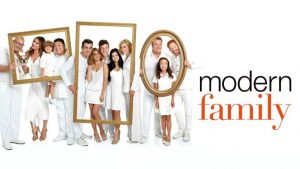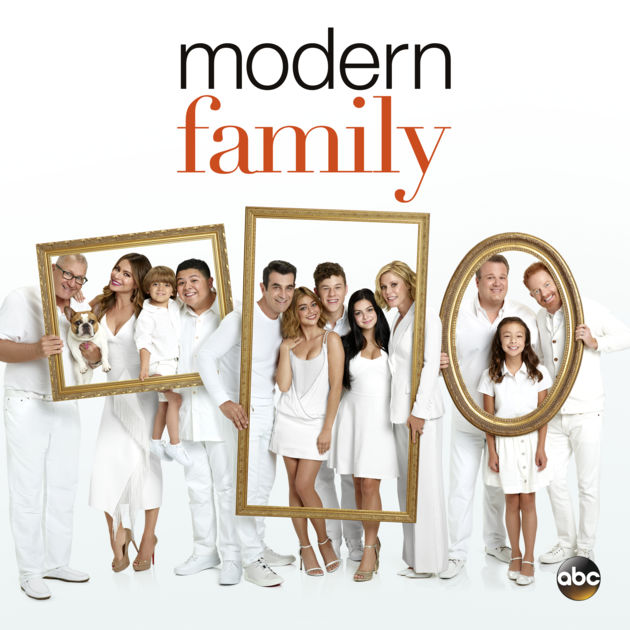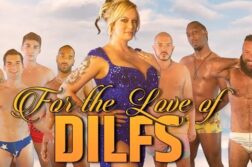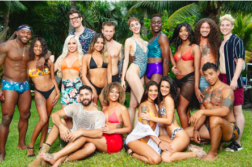
THE POPULAR TV SERIES Modern Family, which debuted on ABC in 2009, is a comedy presented in mockumentary style in which the characters often talk directly into the camera to interject their perspectives. It details the lives of three families, one of which is a gay couple, Mitchell and Cameron, who have an adopted daughter, Lilly. Modern Family is one of the few shows in sitcom history to incorporate a homosexual couple, one that is charming, lovable, and no more dysfunctional than its heterosexual counterparts, to embody, and perhaps help redefine, modern American family values. (It is important to note, however, that the couple’s display of romantic intimacy is curtailed and almost exclusively in the form of friendly hugs.)
In a smart, thoughtful and exceptionally comedic episode, the show depicts the struggles of modern queer people when faced with heteronormative cultural traditions, like Mother’s Day, while simultaneously stereotyping what it means to be gay in American society. By strategically typecasting Mitchell and Cameron as a “normal” couple whose lifestyle is uncannily similar to that of customary heterosexuals, the show creates a new space for queer people—of a specific type—to fit comfortably into modern society, advocating respect and demand for gay rights. However, in doing so, the show limits the space for more dramatic deviation from dominant, heteronormative culture and its overwhelming infringement upon variation in society.
In episode 21 of the second season, titled “Mother’s Day,” Mitchell brings his husband Cam breakfast in bed. Cam’s initial appreciation quickly sours when he realizes that Mitchell’s gesture is in celebration of Mother’s Day, which implies that Cam is more motherly and thus more feminine than his partner. Interestingly, although Cam is flamboyant and some would say “obviously” gay, he is nonetheless insulted when placed in the same category as women: “You think of me as Lilly’s mother. I’m your wife. I’m a woman!” Then, when the scene cuts to mockumentary style, he continues to viewers: “There’s nothing gays hate more than when people treat us like women. We don’t want to go to your baby shower, we don’t have a time of the month, we don’t love pink.” Apart from his next charming remark (“Okay, pink loves me”), there is something quite serious to gain from this scene: Heteronormative gender roles and the idea of men as purely masculine greatly affects not only the dominant culture but queer culture as well, rendering some gay men self-conscious and fearful of appearing womanly.
Of course, Cam is a man and entitled to all the masculinity he wants, but it would be nice if men weren’t programmed to feel slighted every time it’s insinuated that they have feminine traits. When a woman plays baseball with competence, “like a boy,” or pursues a work field dominated by men, she’s likely to be proud or empowered when that’s brought to her attention. But when a man knits a scarf with more pizazz than his grandmother, it’s a source of potential embarrassment when confronted by the preference for masculinity that’s alive and well in contemporary society. The episode displays that Cam’s ideology is akin to that of heteronormative society’s in attempt to create a nonthreatening space in which gays and straights can coexist harmoniously.
The idealized heterosexual couple, the mother and father, is a symbol of family tradition in the dominant culture and is often imposed upon same-sex couples, especially those granted the approval to adopt. For instance, in the same episode, when Cam and Mitchell take Lilly to the park for a Mother’s Day function, Cam is humorously invited into a photograph with all of the mothers as an “honorary mom,” and Mitchell reassures him: “Cam, we’re just a new type of family, they don’t have the right vocabulary for us yet. They need one of us to be the mom.” While Cam then ventures to another part of the park to a play football with an amusing level of incompetence, Mitchell alleges that society is to blame for this awkward misunderstanding of queer gender roles and also suggests that even those who feel they are nonjudgmental are not fully accepting of two men as parents, for they still insist that “one be the mom.” The fact that Mitchell insists that society just “doesn’t have the right vocabulary yet” implies that society is headed in the right direction.
Clearly, the strategy to promote love and acceptance of queer families in Modern Family works insofar as its audience effortlessly falls in love with its queer characters, Cam and Mitchell. Their commitment to each other and their daughter is portrayed as no less real or powerful than that of the heterosexual families depicted in the sitcom. Unlike most queer cultural productions, the show has millions of mainstream viewers, and it has won multiple Emmy Awards and the Golden Globe Award for Best Television Series, proving it an effective platform for spreading awareness of the existence and success of queer American families. But what if Cam and Mitchell had not been portrayed as “normal” couple and instead as one that rejects the modern American family structure and roles? They may have been less readily accepted or even considered a threat to traditional American ideology. In catering to this mainstream and often oppressive ideology of normalcy, the show not only strengthens it but also hampers a beautiful intention of promoting queer and gay rights, offering only one particular, socially compliant, form of queerness.
Megan Allen is a writer based in Santa Rosa, California.






